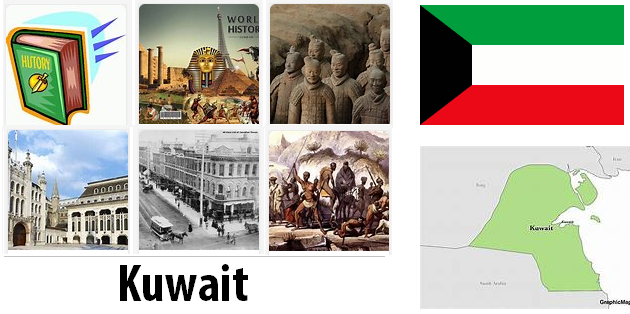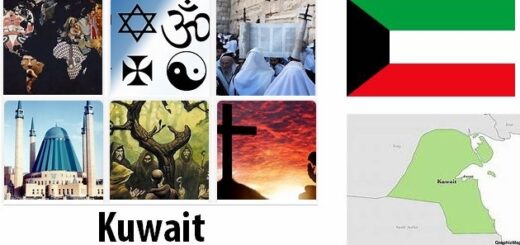Kuwait Recent History
Arab city and emirate on the north-western coast of the Persian Gulf, between Iraq and the Negd. According to Abbreviationfinder, an acronym site which also features history of Kuwait, the inhabitants, a few thousand, live almost exclusively in the city, very few are the Bedouins of the interior who practice pastoralism. The majority of the inhabitants, except those engaged in the vast oil fields, are dedicated to fishing for pearls which they export abundantly.
The first historical information of this country dates back to the XVIII century. The city experienced significant development at the end of this century. Basra, the commercial city of Iraq on Sciat-el-Arab, was occupied by the Persians; the trade transit route was automatically interrupted and another had to be opened, which was that of Al-Kuwait.
During the 19th century, an emirate formed around the city which soon had to undergo Ottoman sovereignty.
At the beginning of the twentieth century England intervened not only to guarantee the autonomy of the small state in the face of the predominant Turkish force, but also to neutralize the aims, not so hidden, of Germany that was already planning to bring the railway up to there which, according to the initial plan, was to go all the way to Baghdad.
So Al-Kuwait was declared an English protectorate. In 1927, in recognition of British interests in the country, the Negd also signed an agreement with Great Britain with a commitment to respect the territorial integrity of Kuwait.
Under the British protectorate, Abdullah as-Salim as-Sabah who, together with an elected Supreme Council, economically transformed the country, while exercising power as absolute monarch, ascended the throne on January 29, 1950. He also intensified international relations especially with all other Arab states, and in July 1961 he officially entered the Arab League after independence was proclaimed in June, after the British mandate expired. Iraq immediately arose with its territorial claims.
To defend the borders of Al-Kuwait, Great Britain sent its troops which were shortly thereafter replaced by those of the Arab League (which remained there until February 1963).
But Iraq in October recognized the new state that had already joined the United Nations in May.
In December 1961 the first elections for the Constituent Assembly took place. The Constitution was promulgated on November 11, 1962. It provided for a National Assembly of 50 members which, in fact, was elected in January 1963.
The power, however, remained in the hands of the king and this caused a crisis in 1965 from which arose a government presided over by the crown prince Sabah Al Salim Al Sabah who, at the death of the “sheikh” Abdallah, which occurred on November 24, 1965, became emir. His successor Giabir Al Ahmed Al Sabah, in May 1966, was in turn proclaimed crown prince.
Some problems weighed on the government of the country. The first was represented by Palestinian immigrants, very culturally and technically prepared, who representing 53% of the population, therefore the majority, asked for the same rights as the natives, that is, the right to vote, free health and school assistance and the possibility of access the high offices of the state. The second major problem was the borders because of the repeated Iraqi attacks. For this reason, when the British mandate expired on 13 May 1971, Kuwait strengthened itself by purchasing weapons.
When the other Arab countries reproached Kuwait for failing to increase financial aid for the Palestinian cause, it decided to commit itself further and in 1973 applied an oil embargo.
In December 1974 the Kuwaiti government also decided to directly control foreign oil companies existing in Kuwait.
The Iraq-Iran conflict brought repercussions to Kuwait where political instability ensued due to the presence in the country of many Iranian Shiite supporters and many foreigners asking for the right to vote, as well as the existence of a progressive movement,
The National Assembly elected in 1975 was dissolved in 1976 by the Emir who died on 31 December 1977 and was replaced by Crown Prince Gabir al-Ahmad al-Gabir, who in 1981 restored the Assembly with the February elections, the outcome of which then it was confirmed in those of 1985.
Between 1985 and 1986, terrorist and criminal acts occurred which caused a split between Parliament and the Emir. Foreigners, especially Iranians, suspected of these acts of destabilization, were expelled and the Emir suspended the Assembly and had severe press censorship applied.
Kuwait, deployed on the side of Iraq in the conflict that this had with Iran, as the end of the conflict approached, limited its concerns for the security of its borders, despite the renewed Iraqi attacks, which occurred in the period 1987/88, Then he entered into an agreement with both Egypt and the Soviet Union for the war supplies that the United States had refused to supply.
In the meantime, however, the domestic economic situation had become precarious and in order to overcome other problems, Kuwait decided to increase entrepreneurial activity abroad and to detach its oil production from that of other states.
These events led to the Iraqi push for the invasion, which took place on August 2, 1990. Iraq, beaten by its allies on February 26, 1991, forced to withdraw its army, set fire to a large number of oil wells in Kuwait.
After these fires, Kuwait was able to strengthen crude production and also obtained a favorable modification of the border with Iraq which lost part of its access to the sea and the extraction area of Rumayla.
The result of the October 1992 elections was a surprise as victory was awarded to the oppositions.
The 50 seats won were divided among several lists: Sunni, Shiite, secular of the Democratic Tribune and liberal of the National Renewal.
These forces had the main task of reorganizing the finances of the state, badly damaged after the war and beyond.
In March 1993 the United Nations completed its work on redefining the borders with Iraq, including that of the sea along the Hur Abdallah waterway.
Meanwhile, in the early nineties, Kuwait had intensified economic and military relations with the United States, Great Britain, France. But those with Iraq remained tense, even if this had recognized Kuwait’s independence in 1994 and accepted the definitive designation of their borders.
The National Assembly, renewed in October 1996, highlighted a greater loyalty of the groups to the monarchy and granted the children of naturalized Kuwaiti the right to vote.
In the July 1999 elections, the liberal, Islamic, Sunni and Shiite oppositions regained the majority and first reopened the discussion, which had begun several times and never ended, of granting the vote to women, who had done so much on the occasion of the conflict with Iraq.


